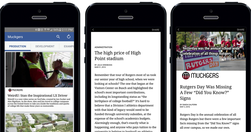Filter 3995 resources:
- media (470)
- social media (450)
- news (369)
- ai (357)
- facebook (337)
- disinformation (252)
- community (214)
- psychology (203)
- innovation (197)
- content strategy (194)
- tool (175)
- productivity (172)
- journalism (152)
- eu (140)
- curation (136)
- filter bubble (134)
- management (127)
- design (123)
- llm (112)
- algorithm (111)
- storytelling (103)
- twitter (98)
- trump (94)
- comments (94)
- science (89)
- atprotocol (86)
- politics (85)
- myhub (84)
- content marketing (84)
- blogging (83)
- promotion (81)
- bluesky (80)
- video (78)
- content (76)
- creativity (75)
- medium (75)
- bot (73)
- publicsphere (70)
- fediverse (70)
- trust (68)
- strategy (66)
- audiovisual (64)
- covid19 (63)
- communications (63)
- blockchain (62)
- google (62)
- us2020 (62)
- privacy (61)
- democracy (61)
- data (61)
- organisation (59)
- participation (58)
- native advertising (57)
- ux (56)
- metrics (56)
- factchecking (55)
- bloggingportal (55)
- newsletter (54)
- mobile (53)
- chatgpt (52)
- identity (50)
- semantic (49)
- blog (49)
- us (49)
- internal communications (48)
- longform (48)
- digital transformation (47)
- troll (46)
- cognitive (46)
- ocm (46)
- advertising (46)
- knowledge management (45)
- online architecture (44)
- enewsletter (44)
- marketing (43)
- startup (43)
- data visualisation (42)
- collective intelligence (42)
- linkedin (41)
- leadership (40)
- web design (39)
- data journalism (39)
- regulation (39)
- engagement (39)
- polarization (39)
- 2ndbrain (38)
- machine learning (37)
- audience research (36)
- hr (36)
- conspiracy (36)
- employee engagement (35)
- science communication (34)
- science journalism (34)
- project management (34)
- ai4communities (33)
- mastodon (32)
- autonomous (32)
- gender (32)
- multilingualism (32)
- open web (32)
- guide (31)
- podcast (31)
- taxibot (30)
- brexit (29)
- gtd (29)
- visualisation (28)
- censorship (28)
- evidence-based policy (28)
- groupthink (28)
- culture (28)
- moderation (27)
- augmented reality (26)
- instant articles (26)
- authenticity (26)
- decentralised (26)
- collaboration (26)
- activitypub (25)
- visual (25)
- platform (25)
- brussels bubble (25)
- propaganda (24)
- seo (24)
- event (24)
- interactive (23)
- policy (23)
- business model (23)
- k4p (22)
- technology (22)
- search (22)
- nytimes (22)
- faq (22)
- obsidian (21)
- open source (21)
- zettelkasten (21)
- ethics (21)
- backfire effect (21)
- bias (21)
- future (21)
- surveillance (20)
- web20 (20)
- usa (20)
- web (20)
- transport (20)
- snapchat (20)
- bbc (19)
- society (19)
- ec (18)
- humour (18)
- transparency (17)
- bullshit (17)
- explainer (17)
- bloggingportal2 (17)
- newsroom (17)
- realtime (17)
- viral (17)
- persuasion (17)
- instagram (17)
- populism (17)
- virtual reality (16)
- influence (16)
- bestof2015 (16)
- infographic (16)
- pr (16)
- politicoeu (16)
- fascism (16)
- delegitimise (16)
- change (16)
- cambridge analytica (16)
- ai prompt (16)
- writing (16)
- roamresearch (15)
- nlp (15)
- uk (15)
- cms (15)
- atprotocol lexicon (15)
- minimalist (15)
- disruption (15)
- social marketing (15)
- analytics (15)
- copyright (14)
- addiction (14)
- qanon (14)
- app (14)
- crowdsourcing (14)
- intranet (14)
- information (14)
- agile (14)
- brand (14)
- big data (14)
- google+ (14)
- meeting (14)
- philosophy (14)
- top3pods (14)
- futurism (14)
- attentionweb (13)
- clickbait (13)
- echo chamber (13)
- dao (13)
- gpt-x (13)
- information architecture (13)
- messaging (13)
- training (13)
- slack (13)
- stream (13)
- yanss (13)
- amp (13)
- personal (12)
- mindfulness (12)
- annotate (12)
- animation (12)
- html5 (12)
- editorial (12)
- cards (12)
- ideation (12)
- ea (12)
- happiness (12)
- hate (12)
- cory doctorow (12)
- europcom (12)
- post-truth (12)
- tv (12)
- gamification (11)
- outreach (11)
- egovernment (11)
- publishing (11)
- buzzfeed (11)
- education (11)
- eurosceptic (11)
- tribe (11)
- livestream (11)
- gdpr (11)
- europe (11)
- massive.wiki (11)
- interface (11)
- chat (11)
- conversation (11)
- confirmation bias (11)
- drupal (10)
- ai-agent-gpt (10)
- apple (10)
- framework (10)
- usability (10)
- gds (10)
- holacracy (10)
- lobby (10)
- russia (10)
- vote (10)
- sceptic (10)
- ep (10)
- rss (10)
- bxlsbbl (10)
- machine translation (10)
- presentation (10)
- domestic (9)
- persona (9)
- intro (9)
- atomisation (9)
- media literacy (9)
- software (9)
- hoax (9)
- climate (9)
- cofoe (9)
- workation (9)
- bitcoin (9)
- narratives (9)
- leaflet (9)
- ahoy2025 (9)
- free speech (9)
- image (9)
- ethan mollick (9)
- deletefacebook (9)
- english (9)
- nostr (9)
- knowledge graph (9)
- partisan (9)
- basic (9)
- sovereignty (9)
- laurens hof (8)
- free (8)
- ui (8)
- api (8)
- automation (8)
- andy matuschak (8)
- election (8)
- centaur (8)
- (8)
- betaworx (8)
- web development (8)
- optimisation (8)
- ethereum (8)
- twitter migration (8)
- design thinking (8)
- euractiv (8)
- eurosceptics (8)
- 360video (8)
- narcissism (8)
- blogpocalypse (8)
- responsive (8)
- wiki (7)
- car (7)
- homepage (7)
- b2b4me (7)
- nft (7)
- conference report (7)
- enshittification (7)
- china (7)
- theme (7)
- sponsored content (7)
- discourse (7)
- groundmist (7)
- cookies (7)
- europa (7)
- tumblr (7)
- deep fake (7)
- email (7)
- ello (7)
- tools (7)
- jeff jarvis (7)
- fblabrats (7)
- quartz (7)
- sublime (7)
- psychometrics (7)
- evolution (7)
- notification (7)
- wikipedia (7)
- substack (7)
- memory (7)
- circa (7)
- screencast (7)
- office365 (7)
- model collapse (7)
- antivaxxer (7)
- risk (7)
- portal (6)
- crm (6)
- google analytics (6)
- meme (6)
- headline (6)
- ai search (6)
- suppress (6)
- whitewind (6)
- meaning (6)
- experiment (6)
- campaign (6)
- reddit (6)
- pay4content (6)
- jobtodo (6)
- bubble (6)
- scrollytelling (6)
- personalisation (6)
- monetisation (6)
- youtube (6)
- truth (6)
- outrage (6)
- knowledge visualisation (6)
- gif (6)
- vine (6)
- expert (6)
- vox (6)
- gordon brander (6)
- blogactiv (6)
- blogger (6)
- datamining (6)
- moments (6)
- help (6)
- threads (6)
- coach (6)
- bandwagon (6)
- network theory (6)
- signaltonoise (6)
- pilot (6)
- inscrutable (6)
- peakbot (5)
- brainstorming (5)
- dni (5)
- ewrc2017 (5)
- web3 (5)
- subconscious (5)
- unfinished (5)
- post-alpha (5)
- themes (5)
- bundle (5)
- it (5)
- antitrust (5)
- resilience (5)
- roi (5)
- christine lemmer-webber (5)
- iot (5)
- interoperability (5)
- coral (5)
- emotion (5)
- guardian (5)
- boris mann (5)
- game (5)
- city (5)
- product/market fit (5)
- fomo (5)
- open data (5)
- context (5)
- team (5)
- economics (5)
- coda (5)
- facebook live (5)
- youth (5)
- expertise (5)
- publicsector (5)
- anti (5)
- bluesky custom feeds (5)
- open science (5)
- credibility (5)
- euro (5)
- pkgbook (5)
- powerpoint (5)
- letters2eu (5)
- debunk (5)
- business (5)
- share (5)
- fotl (5)
- vandenbrande (5)
- local (5)
- rag (5)
- blacksky (5)
- joan westenberg (5)
- mooc (5)
- pitch (5)
- signal2noise (4)
- notebooklm (4)
- comment (4)
- dunning-kruger (4)
- conversational (4)
- cryptocurrency 2.0 (4)
- biology (4)
- physics (4)
- mybot (4)
- note (4)
- author (4)
- inoculation (4)
- conference (4)
- blm (4)
- trends (4)
- habit (4)
- p2p (4)
- buffer (4)
- ahoy (4)
- compositional (4)
- logo (4)
- synthesise (4)
- atproto adoption (4)
- wordpress (4)
- magazine (4)
- government (4)
- notion (4)
- dissonance (4)
- collaborate (4)
- smartcities (4)
- euroblog (4)
- forgotten (4)
- semanticweb (4)
- fbpaper (4)
- corporate journalism (4)
- music (4)
- langchain (4)
- perplexity.ai (4)
- example (4)
- comics (4)
- networking (4)
- pluralistic ignorance (4)
- indieweb (4)
- solid (4)
- spaced repetition (4)
- social (4)
- network effect (4)
- internet (4)
- motivated (4)
- power (4)
- crowdfunding (4)
- australia (4)
- idpi (4)
- douglas rushkoff (4)
- cozyweb (4)
- autogpt (4)
- tag (4)
- language (4)
- semble (4)
- amazon (4)
- trello (4)
- longreads (4)
- ipr (4)
- digital (4)
- planning (4)
- embedding (4)
- research (4)
- report (4)
- botshit (4)
- impact (4)
- sentiment analysis (4)
- understanding (4)
- solutions journalism (4)
- eurosky (4)
- euractiv-com (4)
- alpha phase (4)
- consultancy (4)
- diversity (4)
- statistics (4)
- work (4)
- authoritarianism (4)
- complex (4)
- learning (4)
- competition (4)
- machine text (4)
- meta ventures (4)
- elon musk (4)
- syndication (3)
- posse (3)
- trending (3)
- casey newton (3)
- obama (3)
- pressrelease (3)
- sari azout (3)
- faceted search (3)
- wechat (3)
- eurocrap (3)
- template (3)
- lean canvas (3)
- diverse (3)
- infowar (3)
- tourism (3)
- health (3)
- ghost (3)
- willpower (3)
- assistant (3)
- ma parent (3)
- history (3)
- integrated (3)
- data4policy (3)
- harpa (3)
- law (3)
- millennials (3)
- blogtour (3)
- paper (3)
- data enrichment (3)
- 5whys (3)
- jerry michalski (3)
- service (3)
- archive (3)
- defi (3)
- pkm (3)
- remote (3)
- wisdom (3)
- adversarial interoperability (3)
- meta (3)
- crisis (3)
- token (3)
- chatbot (3)
- user (3)
- governance (3)
- memex (3)
- social capital (3)
- ft (3)
- uber (3)
- journal (3)
- mvp (3)
- altmetric (3)
- library (3)
- vc (3)
- ibm (3)
- logistics (3)
- use case (3)
- fail (3)
- scraping (3)
- mixed reality (3)
- behaviour (3)
- filter (3)
- fear (3)
- co-creation (3)
- resources (3)
- agent (3)
- intrapreneur (3)
- goals (3)
- dark pattern (3)
- mental health (3)
- art (3)
- values (3)
- aggrefilter (3)
- misinform (3)
- office (3)
- scuttlebutt (3)
- meditation (3)
- rebelmouse (3)
- bookmark (3)
- publication (3)
- multitasking (3)
- pattern language (3)
- abtesting (3)
- paywall (3)
- survey (3)
- silos (3)
- mobocracy (3)
- consultation (3)
- weeklyreview (3)
- hbr (3)
- multimedia (3)
- autosummarise (3)
- explanatory (3)
- globalisation (3)
- opinion (3)
- cosmik (3)
- wapo (3)
- adblock (3)
- religion (3)
- scicomm (3)
- empathy (3)
- network (3)
- usp (3)
- slideshow (3)
- openai (3)
- infopocalypse (3)
- security (3)
- quantum (3)
- early adopter (3)
- live (3)
- robert putnam (3)
- digital garden (3)
- demographics (3)
- llama (3)
- traffic (3)
- morality (3)
- transmedia (3)
- radio (3)
- open government (3)
- economy (3)
- gmo (3)
- sharepoint (3)
- readwise (3)
- framing (3)
- ecosystem (3)
- anisota (3)
- sensemaking (3)
- klout (3)
- bryan newbold (3)
- how to (2)
- slidecast (2)
- syndicated-translation (2)
- mapping (2)
- centralised (2)
- isis (2)
- taxonomy (2)
- learn (2)
- fleeting (2)
- honesty (2)
- integrate (2)
- startupy (2)
- code interpreter (2)
- plugin (2)
- reality (2)
- canonical debate lab (2)
- overview (2)
- partnership (2)
- excalidraw (2)
- gab (2)
- twitterenvy (2)
- audio (2)
- newsfeed (2)
- antiviral (2)
- buzzbot (2)
- computational propaganda (2)
- ltinnovate2016 (2)
- mojo (2)
- icebucketchallenge (2)
- bloom (2)
- geo (2)
- balance (2)
- stowe boyd (2)
- career (2)
- h2020 (2)
- smart contract (2)
- ai-image (2)
- zapier (2)
- cloud (2)
- capitalism (2)
- freedom (2)
- wealth (2)
- entrepreneurs (2)
- meerkat (2)
- italy (2)
- open innovation (2)
- online (2)
- feed (2)
- listicle (2)
- reflectivity (2)
- nudge (2)
- tiktok (2)
- slideshare (2)
- procrastination (2)
- reader (2)
- ruben verborgh (2)
- social challenges (2)
- multisig (2)
- geopolitics (2)
- documentary (2)
- lobbying (2)
- edelman (2)
- renee diresta (2)
- fivethirtyeight (2)
- geofence (2)
- desirability (2)
- atconnect (2)
- pdf (2)
- knowledge illusion (2)
- brave (2)
- kpi (2)
- postmodern (2)
- useful (2)
- hype (2)
- fiction (2)
- farcaster (2)
- hosted (2)
- hoaxy (2)
- medicine (2)
- eparltv (2)
- gpt-4o (2)
- python (2)
- text (2)
- eesc (2)
- story (2)
- evidence (2)
- liveblogging (2)
- spambot (2)
- quora (2)
- diigo (2)
- colour (2)
- ted chiang (2)
- plagiarism (2)
- blogosphere (2)
- mindhack (2)
- circa2 (2)
- plato (2)
- civil rights (2)
- metaverse (2)
- liquid democracy (2)
- eci (2)
- pink slime (2)
- backlink (2)
- 3d (2)
- programme (2)
- micro.blog (2)
- adaptive (2)
- yammer (2)
- vice (2)
- serendipity (2)
- genetic (2)
- energy (2)
- mentor (2)
- supergirl (2)
- egov (2)
- asana (2)
- game theory (2)
- m365 (2)
- video_conferencing (2)
- liberalism (2)
- diaspora (2)
- arg (2)
- disgustology (2)
- agora (2)
- basecamp (2)
- cultural exchange (2)
- reinventing (2)
- npr (2)
- standard.site (2)
- intelligence (2)
- calendar (2)
- nasa (2)
- wearable (2)
- safety (2)
- gov2.0 (2)
- kickstarter (2)
- cities (2)
- mediafr (2)
- seenthis (2)
- scaling synthesis (2)
- cohesion (2)
- freelancer (2)
- standards (2)
- nz (2)
- google assistant (2)
- river4 (2)
- cooperatives (2)
- roaming (2)
- metaphor (2)
- rationality (2)
- msword (2)
- apocalypse (2)
- d3 (2)
- public affairs (2)
- claude code (2)
- ifttt (2)
- spain (2)
- wellness (2)
- monopoly (2)
- crowdculture (2)
- ios (2)
- planetary (2)
- healthcare (2)
- skills (2)
- membership (2)
- curatorbot (2)
- flancian (2)
- selfish (2)
- language technology (2)
- reflections (2)
- photography (2)
- eparticipation (2)
- paradigm (2)
- voice (2)
- apathy (2)
- commonspub (2)
- emily m bender (2)
- guru (2)
- routine (2)
- nsa (2)
- efficiency (2)
- course (2)
- migration (2)
- incubator (2)
- purpose (2)
- nuzzle (2)
- information-architecture (2)
- conform (2)
- bureaucracy (2)
- microsoft (2)
- atavist (2)
- loyalty (2)
- ngo (2)
- fedwiki (2)
- maths (2)
- ebook (2)
- mermaid (2)
- peter kaminski (2)
- opencalais (2)
- finance (2)
- uncategorized (2)
- venue (2)
- storyful (2)
- atlantic (2)
- gawker (2)
- cor (2)
- open letter (2)
- keyword (2)
- facial blindness (2)
- telegram (2)
- ibeacon (2)
- mike masnick (2)
- chris aldrich (2)
- green (2)
- sales (2)
- perception (2)
- alignment (2)
- flicc (2)
- label (2)
- meritocracy (2)
- cx (2)
- trade (2)
- navigation (2)
- tutorial (2)
- task (2)
- employeeengagement (2)
- highlight (2)
- osmo (2)
- counter speech (2)
- ontology (2)
- floc (2)
- inequality (2)
- khub (2)
- eu09vs19 (2)
- grjte (2)
- digg (2)
- bioethics (2)
- timeline (2)
- livefyre (2)
- prototype (2)
- prezi (2)
- digital natives (2)
- agriculture (2)
- web2.0 (2)
- internet of things (2)
- genz (1)
- kek (1)
- consent (1)
- epsc (1)
- notd (1)
- drive (1)
- opengov (1)
- hashgraph (1)
- funding (1)
- dellhell (1)
- monitoring (1)
- anonymous (1)
- newscred (1)
- scandinavia (1)
- symbols (1)
- shieldlaw (1)
- programmatic (1)
- data analysis (1)
- democracy shield (1)
- ugc (1)
- eaststratcom (1)
- ipad (1)
- shawn murphy (1)
- steem (1)
- spitzenkanditaten (1)
- lens (1)
- dropbox (1)
- tabula (1)
- myhub chat (1)
- blocklist (1)
- jasper (1)
- glue work (1)
- parler (1)
- github (1)
- eu-treaty-institutions (1)
- white papers (1)
- giannigiacomelli (1)
- skeets (1)
- nat eliason (1)
- illusory (1)
- stanbol (1)
- frontpage.fyi (1)
- autogen (1)
- brain (1)
- intimacy (1)
- referrals (1)
- negativity bias (1)
- think (1)
- spotify (1)
- patent (1)
- seeding (1)
- transcript (1)
- questy (1)
- napkin ai (1)
- reference frame (1)
- isismediablackout (1)
- human (1)
- wikileaks (1)
- ntopic (1)
- friendica (1)
- sage (1)
- streamlit (1)
- reading queue (1)
- pro (1)
- gdrive (1)
- geoengineer (1)
- digitaldiplomacy (1)
- list (1)
- hypothes.is (1)
- knowledge panel (1)
- solr (1)
- bluenotes (1)
- publicsectorinformation (1)
- rdf (1)
- free our feeds (1)
- salesforce (1)
- humanity (1)
- faiss (1)
- disco (1)
- arrogance (1)
- referendum (1)
- apache (1)
- accreditation (1)
- spritely (1)
- newsana (1)
- craft (1)
- deadbot (1)
- pluriverse (1)
- ai reasoning (1)
- energy vampire (1)
- hubspot (1)
- science-research (1)
- elaboration (1)
- capgras (1)
- ai-vision (1)
- inbox zero (1)
- pubhub (1)
- data portability (1)
- transhuman (1)
- sponsor (1)
- wicked (1)
- tftmap (1)
- agi (1)
- ipfs (1)
- laloux (1)
- syllabus (1)
- index (1)
- ussr (1)
- false enforcement (1)
- eu-priorities-and-opinion (1)
- workflow (1)
- primal (1)
- kuhn (1)
- polbot (1)
- justin garrison (1)
- tracker (1)
- jack dorsey (1)
- line (1)
- mediumform (1)
- storyboard (1)
- european (1)
- kindness (1)
- #ilooklikeanengineer (1)
- luck (1)
- meps (1)
- insurge (1)
- lexicon (1)
- grift (1)
- christopher manning (1)
- fractal (1)
- crowdtangle (1)
- inclusion (1)
- spin (1)
- lisp (1)
- eurosplinternet (1)
- eurostack (1)
- myhub pinboard (1)
- colfdusion (1)
- database (1)
- uncertainty (1)
- w3c (1)
- linked data (1)
- atmosphere health (1)
- talia stroud (1)
- eli pariser (1)
- scarcity (1)
- dark forest web (1)
- stack overflow (1)
- oecd (1)
- pipeline (1)
- technocracy (1)
- rural (1)
- ourobouros (1)
- contact (1)
- excel (1)
- glass (1)
- pinterest (1)
- buzz (1)
- d2d (1)
- groupfeel (1)
- sidechain (1)
- miro (1)
- happeningo (1)
- overload (1)
- votewatch (1)
- warning (1)
- at4democracy (1)
- maestro app (1)
- autocorrelation (1)
- etf (1)
- oracle (1)
- flipboard (1)
- snapshot (1)
- nerd (1)
- zenkit (1)
- specialist (1)
- smart dust (1)
- ep2014 (1)
- overfitting (1)
- micro-moment (1)
- search-or-create (1)
- truth psychology (1)
- llama2 (1)
- parse.ly (1)
- hootsuite (1)
- upworthy (1)
- lexii.ai (1)
- singularity (1)
- unreality (1)
- international (1)
- ostrom (1)
- telepresence (1)
- genius (1)
- omission (1)
- spectacles (1)
- freeourfeeds (1)
- hume (1)
- argdown (1)
- intern (1)
- cro (1)
- false memory (1)
- deep learning (1)
- ip (1)
- statup (1)
- content partnership (1)
- anuj ahooja (1)
- speed (1)
- app development (1)
- immigration (1)
- threadapalooza (1)
- einstein (1)
- augmented intelligence (1)
- adobe (1)
- terrorism (1)
- social-media (1)
- fraud (1)
- onboarding (1)
- programmes (1)
- theoretical physics (1)
- section230 (1)
- christensen (1)
- freedumb (1)
- mba (1)
- gas town (1)
- test (1)
- germany (1)
- robin berjon (1)
- anonymity (1)
- weltschmerz (1)
- myers briggs (1)
- edge (1)
- comparison (1)
- socialhome (1)
- democrats (1)
- hungarian (1)
- insurrection (1)
- mtf (1)
- sill (1)
- euelecitons2019 (1)
- wikinews (1)
- lifelonglearning (1)
- expiration (1)
- information laundering (1)
- barry prendergast (1)
- vlog (1)
- detox (1)
- defensibility (1)
- ubi (1)
- belgium (1)
- quality (1)
- discord (1)
- membrain (1)
- binggpt (1)
- content shock (1)
- friendship (1)
- ub (1)
- storyline (1)
- smartsheet (1)
- tracking (1)
- twins (1)
- menu (1)
- evgeny morozov (1)
- virtual (1)
- documentation (1)
- boredom (1)
- choice (1)
- landing page (1)
- ibm watson (1)
- theatre (1)
- region (1)
- category (1)
- stochastic parrot (1)
- compass news (1)
- ideas (1)
- screencapture (1)
- robot (1)
- ai psychosis (1)
- workspace (1)
- review (1)
- ecas (1)
- loforo (1)
- trove (1)
- sociology (1)
- protocol (1)
- heart (1)
- circuit-breaker (1)
- inception (1)
- sapiens (1)
- snowden (1)
- open social (1)
- 2014 (1)
- cluetrain (1)
- upday (1)
- moloch (1)
- portfolio (1)
- skyfeed (1)
- teal (1)
- zuboff (1)
- bayes (1)
- social physics (1)
- debatehub (1)
- splinternet (1)
- profile (1)
- pets (1)
- perennial (1)
- dopamine (1)
- small is beautiful (1)
- matrix (1)
- sift (1)
- imdb (1)
- process (1)
- empath (1)
- geny (1)
- flux garden (1)
- newsguard (1)
- bridgit (1)
- self-management (1)
- digital civility (1)
- sensecraft (1)
- ted (1)
- yahoo (1)
- quiz (1)
- prompt engineering (1)
- 3dprinting (1)
- clickup (1)
- harvest (1)
- mep (1)
- bingchat (1)
- bootstrapping (1)
- bestpractice (1)
- open access (1)
- ombudsman (1)
- euelections2019 (1)
- trust net (1)
- anger (1)
- koodos (1)
- sane app (1)
- adaptive content (1)
- milo (1)
- firefox (1)
- enpi (1)
- vector database (1)
- bonfire (1)
- curiosity (1)
- o'reilly (1)
- muckread (1)
- reflect (1)
- hololens (1)
- horizonprogramme (1)
- llmo (1)
- life (1)
- css (1)
- dell (1)
- richard medic (1)
- znlive (1)
- launch (1)
- eptv (1)
- hangout (1)
- rebut (1)
- doge (1)
- creativecommons (1)
- truthbuzz (1)
- update (1)
- register (1)
- markup (1)
- crime (1)
- rebuttal (1)
- custom instructions (1)
- chainlink (1)
- justice-home-affairs (1)
- liability (1)
- bedrock (1)
- imposter syndrome (1)
- disrupt (1)
- apple news (1)
- optimism (1)
- nhscitizen (1)
- lofi (1)
- timing (1)
- i-book (1)
- o1 (1)
- combinatorial (1)
- slide (1)
- patchwork (1)
- infosociety (1)
- rail (1)
- documentum (1)
- glossary (1)
- po.et (1)
- moodle (1)
- rewild (1)
- altright (1)
- customer support (1)
- open ledger project (1)
- citizen journalism (1)
- cpms (1)
- guidelines (1)
- ambassador (1)
- mixture of experts (1)
- tone (1)
- litmus (1)
- furniture (1)
- native (1)
- air (1)
- fwb (1)
- peak (1)
- elearning (1)
- qms (1)
- bard (1)
- garden (1)
- dynamics (1)
- nfc (1)
- wargame (1)
- al (1)
- rationalisation (1)
- chipotle (1)
- moc (1)
- nature magazine (1)
- nextcloud (1)
- support (1)
- raf (1)
- twitter cards (1)
- fakebox (1)
- bertelsmann (1)
- hedgehog (1)
- european parliament (1)
- data void (1)
- commonplace (1)
- anthropocentric (1)
- jelly (1)
- yanns (1)
- scrivener (1)
- euvsdisinfo (1)
- philippines (1)
- emergingus (1)
- social login (1)
- fuego (1)
- polls (1)
- manufacturing (1)
- videp (1)
- arena (1)
- will storr (1)
- social fiction (1)
- original (1)
- cardsort (1)
- bug (1)
- farm (1)
- epale (1)
- custom search (1)
- programming (1)
- soonfeed (1)
- loqseq (1)
- lists (1)
- ite (1)
- wef (1)
- sidewire (1)
- cocomo (1)
- yoyogi app (1)
- structure (1)
- ssi (1)
- schema.org (1)
- quantum computing (1)
- drone (1)
- fastlane (1)
- filecoin (1)
- book (1)
- screen writing (1)
- speech to text (1)
- webgl (1)
- extraheric (1)
- subcontractors (1)
- halo (1)
- blockstream (1)
- dissemination (1)
- seme (1)
- word2vec (1)
- woke (1)
- capacities (1)
- eu2024 (1)
- airbnb (1)
- customers (1)
- cookiepocalypse (1)
- blendle (1)
- clubhouse (1)
- speaker (1)
- sf (1)
- 3p framework (1)
- listapp (1)
- broadcast (1)
- listen (1)
- dall-e3 (1)
- citizenship (1)
- alexandra geese (1)
- rel8 (1)
- homophily (1)
- define (1)
- dataview (1)
- electric vehicle (1)
- pwa (1)
- tabloid (1)
- deplatform (1)
- cancel culture (1)
- title (1)
- briefing (1)
- wallet (1)
- group (1)
- react (1)
- messenger (1)
- jtbd (1)
- boston consulting group (1)
- humility (1)
- linear (1)
- upshot (1)
- slacktivism (1)
- vomit (1)
- zappos (1)
- bookmarklet (1)
- assist (1)
- criti-hype (1)
- map (1)
- entrainment (1)
- moodlenet (1)
- version control (1)
- jagged frontier (1)
- liberating structures (1)
- hyperknowledge (1)
- corruption (1)
- video editing (1)
- streamplace (1)
- peace data (1)
- tailwind (1)
- esport (1)
- chinese room (1)
- extraction (1)
- ginsburg (1)
- beeple (1)
- bill anderson (1)
- design competition (1)
- insurance (1)
- anthropomorphic (1)
- intrasoft (1)
- altruism (1)
- gems app (1)
- quaero (1)
- multisite (1)
- lgbt (1)
- assimilation (1)
- paid (1)
- forum (1)
- grassroots (1)
- crosspost (1)
- thought leadership (1)
- alphafold (1)
- foxhog (1)
- ward cunningham (1)
- poetry (1)
- mind meld (1)
- client (1)
- fair (1)
- life-in-belgium (1)
- bridge (1)
- sub.club (1)
- plexus (1)
- smart connections (1)
- grow (1)
- the conversation (1)
- customise (1)
- scale (1)
- sparse data (1)
- ektron (1)
- chameleon (1)
- alan blackwell (1)
- llamaindex (1)
- benchmarking (1)
- periscope (1)
- fintech (1)
- independence (1)
- nautilus (1)
- ludicity (1)
- reversal curse (1)
- distributed (1)
- deep canvassing (1)
- richard dawkins (1)
- liquid (1)
- delusion (1)
- “illusory (1)
- save social (1)
- time (1)
- guardrail (1)
- urbit (1)
- ulysses pact (1)
- cmv (1)
- playbook (1)
- diig (1)
- saas (1)
- gander (1)
- renée diresta (1)
- quit (1)
- blackpr (1)
- embodiment (1)
- block (1)
- continuous scroll (1)
- myanmar (1)
- answer engine (1)
- accessibility (1)
- storymapjs (1)
- commoditisation (1)
- slow news (1)
- plandemic (1)
- purity spiral (1)
- channel (1)
- phanpy (1)
- vsop (1)
- coase (1)
- middleware (1)
- visualization (1)
- dikw (1)
- vr (1)
- experience (1)
- ukraine (1)
- stuck (1)
- lockss (1)
- aspire (1)
- google glass (1)
- sensors (1)
- twxplorer (1)
- stacked note (1)
- overton window (1)
- length (1)
- fox (1)
- seamful (1)
- generative art (1)
- multiplayer (1)
- smo (1)
- wayback (1)
- flow state (1)
- hive (1)
- snowfall (1)
- adolescence (1)
- cancer (1)
- graze (1)
- work processing (1)
- reframing (1)
- toptask (1)
- participatory culture (1)
- consumer (1)
- specialised (1)
- specification gaming (1)
- recursion (1)
- gatsby (1)
- ezra klein (1)
- cui bono (1)
- chinese (1)
- popvox (1)
- ixd (1)
- intuition (1)
- personality (1)
- dunbar (1)
- status anxiety (1)
- rantic (1)
- ambition (1)
- goodwill (1)
- wikitribune (1)
- ronen tamari (1)
- butter (1)
- gmail (1)
- investment (1)
- accelerator (1)
- essena (1)
- simon willison (1)
- weird (1)
- right (1)
- surprisal (1)
- telework (1)
- radicalisation (1)
- biased assimilation (1)
- hxc (1)
- mistral (1)
- inspiration (1)
- critical theory (1)
- overtask (1)
- innovation-and-growth (1)
- cyborg (1)
- timeline.js (1)
- camtasia (1)
- presseurop (1)
- play (1)
- reinforcement learning (1)
- viber (1)
- imported (1)
- whatsapp (1)
- casestudy (1)
- yellow-card (1)
- dsa (1)
- persona prompt (1)
- presidency (1)
- film (1)
- googledrive (1)
- wireframe (1)
- detect (1)
- age verification (1)
- consciousness (1)
- cio (1)
- orbit (1)
- alpca (1)
- shortform (1)
- putin (1)
- yeats (1)
- gravity (1)
- sortition (1)
- indignation (1)
- meaning alignment institute (1)
- neural link (1)
- tips (1)
- eeas (1)
- convert (1)
- tackk (1)
- eureka (1)
- ghostreader (1)
- coffee (1)
- geolocation (1)
- new public (1)
- samsung (1)
- student (1)
- kevin marks (1)
- epistocracy (1)
- devops (1)
- data union (1)
- kanban (1)
- dialogue (1)
- noam chomsky (1)
- oatmeal (1)
Relevant Overviews
- Content Strategy
- Online Strategy
- Online Community Management
- Social Media Strategy
- Content Creation & Marketing
- Online Architecture
- Digital Transformation
- Change & Project Management
- Blockchain, Crypto, NFTs etc
- Personal Productivity
- Innovation Strategy
- Surveillance Capitalism, Social media and Polarisation (Overview)
- Communications Tactics
- Psychology
- Social Web
- Media
- Politics
- Communications Strategy
- Science&Technology
- Business

The Turing Test is supposed to determine whether a machine can think, or seem to think. How would you test whether a machine can process and simulate feelings so well that a human user could develop real feelings for it? Well, how do you test whether you could love anyone?You flirt.... The goals of flirting... resemble the goals of contemporary …

Trump staged a rally in which three girls–called “The Freedom Kids”–lip-synched a pop song praising the brutality of their incumbent leader. “... Deal from strength or get crushed every time!” they sang... Many Americans found it baffling. For those familiar with the decadent patriotism of Central Asian national performances... it was disconcertin…
...people are willing to engage with longer content (i.e., news stories over 1,000 words) on their phones... All of the articles studied here were read on the mobile web, not via apps. Since most apps are designed to deliver a better reading experience, “that could further the time people are willing to commit to longer stories,”... Pew found no s…
Ironically, with the widening of (national) news choices that the Internet has spawned, we’re depending on fewer pipelines of news. It’s a narrowing of the filter funnel...t as troubling as the filter bubbles that used to occupy our concerns, but likely more potent. As those pipelines narrow, necessarily, the decision on what is news, and what is …

The solution is in a new method of policy making with strong similarities to the agile approach ... “Policy making will be service design, and the designing of services will be the making of policy. Ideas and their implementation will be so close together... The way the law is made will have to change.

the longer a democracy lasted, Plato argued, the more democratic it would become. Its freedoms would multiply; its equality spread. Deference to any sort of authority would wither... But it is inherently unstable. As the authority of elites fades... views and identities can become so magnificently diverse as to be mutually uncomprehending... There…

Newspapers, magazines and other publishers are "feeding on the scraps" of Facebook's multibillion-dollar ad business despite playing a central role in keeping the social network's users happy... "They keep the $16bn to $18bn they get in the news feed... with personal sharing down, is ... effectively just an aggregation of premium publishers' cont…

Facebook is not a friend of journalism.. Yes, Instant Articles are sexy and monetisable... a hugely important route to readers, but the more dependent we get on them, the more they’ll be able to charge us to access that audience... Facebook is seeing an alarming (to them) drop in sharing of personal information...we’ll see Facebook start to turn d…

Advertising revenue grew by more than 50 percent since 2015, the company was hard at work on a future for artificial intelligence and virtual reality, and the average Facebook user is spending 50 minutes per day on Facebook, Instagram and Messenger.... more time than people spend reading ... sports ... or social events... Politics is downstream f…

Media companies are ‘broadcasting’ pre-recorded clips use the social network’s new feature... does not recommend streaming pre-recorded content... a strength of the feature is the ability for on-camera hosts to interact with viewers in real time... After they are streamed, Facebook Live videos function as normal Facebook videos.

Why not take some inspiration from the best headlines of the best headline writers? The blueprints exist to get your tweets, emails, updates, and articles clicked.
Here’s a quick overview on the four different primary forms of design to help you understand what they mean.
Pluto-focused project, upcoming episodic series, and experiments with “meditative VR,” The Times is experimenting with different applications for the new technology... The idea is to do proper VR shows that have a through-line and episodic structure... We’re looking at an experience that we jokingly call “meditative VR.” These are single-shot, no…

After so much talking about the risks of ultraintelligent machines, it is time to turn on the light, stop worrying about sci-fi scenarios, and start focusing on AI’s actual challenges, in order to avoid making painful and costly mistakes in the design and use of our smart technologies... Believers in true AI and in Good’s ‘intelligence explosion’…

People don’t just consume news today. They participate in it... an opportunity for news publishers strained by shrinking resources and growing competition: Now more than ever, journalists can engage their audiences as contributors, advisors, advocates, collaborators and partners. This study describes in detail how newsrooms and independent journal…
Think about platforms as fishing places where you can find large, engaged audiences and build a relationship with them by providing content. Then offer these users some other services off-platform... Never outsource the future... a great primer for news organizations just starting to tackle the distributed world and a good checklist for those mor…
In response to The Power of Writing About the Things You Read, by Srinivas Rao: "Fortunately, there are loads of digital equivalents to dog-earing pages and underlining passages for when you’re reading on a PC or phone. My favourite tools and processess: ..."

Government Chief Scientist, Sir Mark Walport, sets out how this technology could transform the delivery of public services and boost productivity... The report makes a number of recommendations which focus on ministerial leadership, research, standards and the need for proof of concept trials.

Blockchain... - is already being explored as a way of securely managing the distribution of government grants... a key role in the Government as a Platform programme to create "an ecosystem of interconnected components that departmental teams can use to assemble their services ... foster a new culture of trust”.

journalists can engage their audiences as contributors, advisors, advocates, collaborators and partners. This study describes in detail how newsrooms and independent journalists can grow their readership, boost their relevance and find new sources of revenue by listening to and learning from their audiences.... This is about how journalists can ge…

by using social media curation, news organisations can remove the need for readers to look elsewhere, by automatically pulling in relevant social content from around the internet onto their websites... produce a quick breaking-news social stream related to a subject, or social content specifically focused to highlight the ideas and arguments withi…

we’ll guide you through the ins and outs of Facebook’s publishing platform and how to get started.

I’m going through the motions of converting my old digital news startup, Muckgers, into a Facebook-first publication.. Theoretically, all you have to do is install a plugin, insert a few lines of code into the HTML of your website, connect your RSS feed to your publication’s Facebook page, submit 10 sample Instant Articles for review and, pending …

AI can be effective, particularly its Natural Language Processing (NLP) aspect — but only in the right context... we need to work out when it’s a help and when it’s a hindrance... Whilst AI may be the new kid on the technological block, it works best as a complement to good UI, not a substitute.
I was taking work as it came in. Hustling, squabbling over rates, and trying to collect on long past-due invoices. I can feel the knots in my stomach to this day.I had no platform. My personal blog had 30 email subscribers, mostly composed of family and friends. I was burned out. My muchness was gone. I needed to get it back.

Facebook says it’s not worried about the level of sharing from everyday users ... concerns that people are starting to use Facebook more like they use Twitter — passively consuming content instead of creating new material... a report from The Information said there has been a 20 percent decline in “original” content from users in the past year.

Study shows political discussions are ruining Facebook and friendships... users who try to talk about politics on Facebook are often surprised by the political opinions of their acquaintances... a diverse set of opinions among a user's friends makes everyone want to speak up less...Facebook has a low threshold for “friending” ... can bridge togeth…

The feed is dying, and we feel shocked by its death — but we shouldn’t... imagine a library organized chronologically, or even the morning edition of a newspaper... the curated feed ... can, theoretically, eliminate posting anxiety, find the people you want to talk to (and the people you want to hear from) and make the experience of posting feel …

As we learn about the ways people use the news, what features might invite their trust and loyalty?... 32 senior strategists, designers, and developers... created prototype tools to surface the Trust Project indicators of quality, a set of fundamental journalistic principles that align with today’s news users wants and needs.

But what we are building with artificial reality is an internet of experiences... although every one of these environments was fake, the experiences I had in them were genuine... you gain authentic experiences, as authentic as in real life. People remember VR experiences not as a memory of something they saw but as something that happened to them.…
Loading more...
Relevant Overviews
- Content Strategy
- Online Strategy
- Online Community Management
- Social Media Strategy
- Content Creation & Marketing
- Online Architecture
- Digital Transformation
- Change & Project Management
- Blockchain, Crypto, NFTs etc
- Personal Productivity
- Innovation Strategy
- Surveillance Capitalism, Social media and Polarisation (Overview)
- Communications Tactics
- Psychology
- Social Web
- Media
- Politics
- Communications Strategy
- Science&Technology
- Business